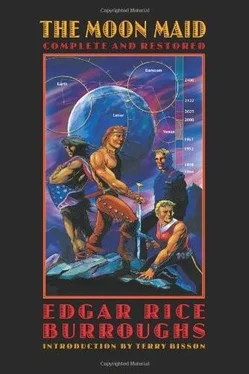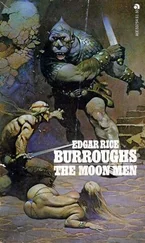Edgar Burroughs - The Moon Maid
Здесь есть возможность читать онлайн «Edgar Burroughs - The Moon Maid» весь текст электронной книги совершенно бесплатно (целиком полную версию без сокращений). В некоторых случаях можно слушать аудио, скачать через торрент в формате fb2 и присутствует краткое содержание. Жанр: Боевая фантастика, на английском языке. Описание произведения, (предисловие) а так же отзывы посетителей доступны на портале библиотеки ЛибКат.
- Название:The Moon Maid
- Автор:
- Жанр:
- Год:неизвестен
- ISBN:нет данных
- Рейтинг книги:3 / 5. Голосов: 1
-
Избранное:Добавить в избранное
- Отзывы:
-
Ваша оценка:
- 60
- 1
- 2
- 3
- 4
- 5
The Moon Maid: краткое содержание, описание и аннотация
Предлагаем к чтению аннотацию, описание, краткое содержание или предисловие (зависит от того, что написал сам автор книги «The Moon Maid»). Если вы не нашли необходимую информацию о книге — напишите в комментариях, мы постараемся отыскать её.
The Moon Maid — читать онлайн бесплатно полную книгу (весь текст) целиком
Ниже представлен текст книги, разбитый по страницам. Система сохранения места последней прочитанной страницы, позволяет с удобством читать онлайн бесплатно книгу «The Moon Maid», без необходимости каждый раз заново искать на чём Вы остановились. Поставьте закладку, и сможете в любой момент перейти на страницу, на которой закончили чтение.
Интервал:
Закладка:
West, who was the senior among them, was naturally the one to reply first. He told me that he was content to go wherever I led, and Jay and Norton in turn signified a similar willingness to abide by whatever decision I might reach. They also assured me that they were as keen to explore the surface of the Moon at close range as I, and that they could think of no better way of spending the remainder of their lives than in the acquisition of new experiences and .the observation of new scenes.
“Very well, Mr. Norton,” I said, “you will set your course directly toward the Moon.”
Aided by lunar gravity our descent was rapid. As we plunged through space at a terrific speed, the satellite seemed to be leaping madly toward us, and at the end of fifteen hours I gave orders to slack off and brought the ship almost to a stop about nine thousand feet above the summit of the higher lunar peaks. Never before had I gazed upon a more awe-inspiring scene than that presented by those terrific peaks towering five miles above the broad valleys at their feet. Sheer cliffs of three and four thousand feet were nothing uncommon, and all was rendered weirdly beautiful by the variegated colors of the rocks and the strange prismatic hues of the rapidly-growing vegetation upon the valley floors. From our lofty elevation above the peaks we could see many craters of various dimensions, some of which were huge chasms, three and four miles in diameter. As we descended slowly we drifted directly over one of these abysses, into the impenetrable depths of which we sought to strain our eyesight. Some of us believed that we detected a faint luminosity far below, but of that we could not be certain. Jay thought it might be the reflected light from the molten interior. I was confident that had this been the case there would have been a considerable rise of temperature as we passed low across the mouth of the crater.
At this altitude we made an interesting discovery. There is an atmosphere surrounding the Moon. It is extremely tenuous, but yet it was recorded by our barometer at an altitude of about fifteen hundred feet above the highest peak we crossed. Doubtless in the valleys and deep ravines, where the vegetation thrived, it is denser, but that I do not know, since we never landed upon the surface of the Moon. As the ship drifted we presently noted that it was taking a circular course paralleling the rim of the huge volcanic crater above which we were descending. I immediately gave orders to alter our course since, as we were descending constantly, we should presently be below the rim of the crater and, being unable to rise, be hopelessly lost in its huge maw. It was my plan to drift slowly over one of the larger valleys as we descended, and make a landing amidst the vegetation which we perceived growing in riotous profusion and movement beneath us. But when West, whose watch it now was, attempted to alter the course of the ship, he found that it did not respond. Instead it continued to move slowly in a great circle around the inside of the crater. At the moment of this discovery we were not much more than five hundred feet above the summit of the volcano, and we were constantly, though slowly, dropping. West looked up at us, smiled, and shook his head.
“It is no use, sir,” he said, addressing me. “It is about all over, sir, and there won’t even be any shouting. We seem to be caught in what one might call a lunar whirlpool, for you will have noticed, sir, that our circles are constantly growing smaller.”
“Our speed does not seem to be increasing,” I remarked, “as would follow were we approaching the vortex of a true whirlpool.”
“I think I can explain it, sir,” said Norton. “It is merely due to the action of the Lunar Eighth Ray which still remains in the forward buoyancy tank. Its natural tendency is to push itself away from the Moon, which, as far as we are concerned, is represented by the rim of this enormous crater. As each portion of the surface repels us in its turn we are pushed gently along in a lessening circle, because, as we drop nearer the summit of the peak the greater the reaction of the Eighth Lunar Ray. If I am not mistaken in my theory our circle will cease to narrow after we have dropped beneath the rim of the crater.”
“I guess you are right, Norton,” I said. “At least it is a far more tenable theory than that we are being sucked into the vortex of an enormous whirlpool. There is scarcely enough atmosphere for that, it seems to me.”
As we dropped slowly below the run of the crater the tenability of Norton’s theory became more and more apparent, for presently, though our speed increased slightly, the diameter of our circular course remained constant, and, at a little greater depth, our speed as well.
We were descending now at the rate of a little over miles an hour, the barometer recording a constantly creasing atmospheric pressure, though nothing approximating that necessary to the support of Me upon The temperature rose slightly, but not alarmingly, at a range of twenty-five or thirty below zero, immediately after we had entered the shadow of the crater’s interior it rose gradually to zero at a point some one hundred and twenty-five miles below the summit of the giant extinct volcano that had engulfed us.
During the next ten miles our speed diminished ran idly, until we suddenly realized that we were no longer falling, but that our motion had been reversed and we were rising. Up we went for approximately eight miles when suddenly we began to fall again. Again we fell, but this time for only six miles, when our motion was reversed and we rose again a distance of about four miles. This see-sawing was continued until we finally came to rest at about what we estimated was a distance of some one hundred and thirty miles below the summit of the crater. It was quite dark, and we had only our instruments to tell us of what was happening to the ship, the interior of which was, of course, brilliantly illuminated and comfortably warm.
Now below us, and now above us, for the ship had rolled completely over each time we had passed the point at which we came finally to rest, we had noted the luminosity that Norton had first observed from above the mouth of the crater. Each of us had been doing considerable thinking, and at last young Norton could contain himself no longer.
“I beg your pardon, sir,” he said deferentially, “but won’t you tell us what you think of it; what your theory is as to where we are and why we hang here in mid-air, and why the ship rolled over every time we passed this point?”
“I can only account for it,” I replied, “upon a single, rather preposterous hypothesis, which is that the Union is a hollow sphere, with a solid crust some two hundred and fifty miles in thickness. Gravity is preventing us from rising above the point where we now are, while centrifugal force keeps us from falling.”
The others nodded. They too had been forced to accept the same apparently ridiculous theory, since there was none other that could explain our predicament. Norton had walked across the room to read the barometer which he had rather neglected while the ship had been performing her eccentric antics far below the surface of the Moon. I saw his brows knit as he glanced at it, and then I saw him studying it carefully, as though to assure himself that he had made no mistake in the reading. Then he turned toward us.
“There must be something wrong with this instrument, sir,” he said. “It is registering pressure equivalent to that at the Earth’s surface.”
I walked over and looked at the instrument. It certainly was registering the pressure that Norton had read, nor did there seem to be anything wrong with the instrument.
“There is a way to find out,” I said. “We can shut down the insulating generator and open an air-cock momentarily. It won’t take five seconds to determine whether the barometer is correct or not.” It was, of course, in some respects a risky proceeding, but with West at the generator, Jay at the air cock and Norton at the pump I knew that we would be reasonably safe, even if there proved to be no atmosphere without. The only danger lay in the chance that we were hanging in a poisonous gas of the same density as the earthly atmosphere, but as there was no particular incentive to live in the situation in which we were, we each felt that no matter what chance we might take it would make little difference in the eventual outcome of our expedition.
Читать дальшеИнтервал:
Закладка:
Похожие книги на «The Moon Maid»
Представляем Вашему вниманию похожие книги на «The Moon Maid» списком для выбора. Мы отобрали схожую по названию и смыслу литературу в надежде предоставить читателям больше вариантов отыскать новые, интересные, ещё непрочитанные произведения.
Обсуждение, отзывы о книге «The Moon Maid» и просто собственные мнения читателей. Оставьте ваши комментарии, напишите, что Вы думаете о произведении, его смысле или главных героях. Укажите что конкретно понравилось, а что нет, и почему Вы так считаете.








